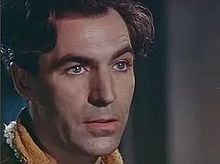David Farrar |
|---|
 |
| Born | (1908-08-21)21 August 1908
|
|---|
| Died | 31 August 1995(1995-08-31) (aged 87)
|
|---|
| Resting place | Cremains scattered into the Indian Ocean |
|---|
| Years active | 1937-1962 |
|---|
| Spouse | Irene Elliot (1929-1976) 1 child |
|---|
David Farrar (21 August 1908 – 31 August 1995) was an English stage and film actor. He gained fame in the 1940s playing Sexton Blake in a pair of low-budget thrillers which were enormously popular. By 1945 he was receiving 800 fan letters a week.[1][2]
Three of his most notable film roles were leads in the Powell and Pressburger films Black Narcissus (1947), The Small Back Room (1949) and Gone to Earth (1950). According to one obituary, "He was particularly adept at conveying the weaknesses and human qualities in figures of authority and intelligence... and he could be considered an early exponent of "anti-hero" roles."
[3] In 1949 exhibitors voted him the ninth-most popular British star.[4]
Director Michael Powell once spoke of his handsome appearance and distinctive "violet eyes", and his exceptional timing in films. Powell also stated that had Farrar been more interested in cinema and cared more about his career he could have been a much more high-profile actor, as successful as any.[5] John Huston once offered him a part but it was given to Humphrey Bogart instead.[5]
Career
Farrar was born in Forest Gate, east London. He joined the Morning Advertiser on leaving school at 15 and worked as a journalist until he quite to be an actor in 1932.
He worked on stage and ran a repertory company with his wife until 1937. His first film role was the Jessie Matthews musical Head Over Heels (1937). He also had small roles in Return of a Stranger (1937), Silver Top (1938), and A Royal Divorce (1938). He played agent Granite Grant in Sexton Blake and the Hooded Terror (1938) and had a small role in Q Planes (1939).
Leading Man
Farrar had his first leading role in Danny Boy (1941) which he followed with Sheepdog of the Hills (1941) and Suspected Person (1942). These were "B" movies but Farrar had a good role in an "A", Went the Day Well? (1942), as a villainous German.
He had good roles in The Dark Tower (1943) and They Met in the Dark (1943) and the lead in Headline (1943) and The Night Invader (1944). He was a heroic commander of an air-sea rescue util in For Those in Peril (1944), an accountant in The Hundred Pound Window (1944) and a pilot in The World Owes Me a Living (1945).
Farrar starred as Sexton Blake in two films, Meet Sexton Blake (1945) and The Echo Murders (1945). He was an intelligence officer in Lisbon Story (1946).
Stardom
Farrar transformed from leading man to star when he was cast as the British agent in Black Narcissus (1947) who tempts nuns played by Deborah Kerr and Kathleen Byron. Made by the team of Powell and Pressburger the film was popular and has since come to be regarded as a classic.
Farrar followed it playing the officer who brings home a German wife (Mai Zetterling) in Frieda (1947) directed by Basil Dearden. It was the ninth biggest film in Britain of the year.[6]
Farrar played a charismatic school teacher in Mr. Perrin and Mr. Traill (1948) then was reunited with Powell and Pressburger for The Small Back Room (1949). According to his obituary "Farrar was given a true star's entrance in the film, the camera tracking along a bar of customers until coming to rest upon the actor's back. His character's name is called and he turns to face the camera in full close-up."[3]
Gainsborough Pictures was him in the lead of a "British Western" shot in South Africa Diamond City (1949), playing Stafford Parker. The film was a flop.
He reunited with Dearden for Cage of Gold (1950) and Powell and Pressburger for [[Gone to Earth (film)]|Gone to Earth]] (1950), a box office disappointment. Farrar would later claim this three films for Powell, and Cage of Gold, were the artistic highlight of his career.[3]
Farrar's stardom soon lost momentum: The Late Edwina Black (1951), Night Without Stars (1951). Hollywood offered him a heroic part in The Golden Horde (1951), at Universal with Ann Blyth. It was a minor hit.
Supporting Actor
He was in I Vinti (1953) in Italy then played villains in some Hollywood films: Duel in the Jungle (1954), and The Black Shield of Falworth (1954). He supported Anna Neagle in Lilacs in the Spring (1955) and was a supporting actor in Escape to Burma (1955), The Sea Chase (1955), and Pearl of the South Pacific (1956). Farrar returned for leads in Lost' (1956) then was back to support parts:I Accuse! (1958), The Son of Robin Hood (1958), Watusi (1959), John Paul Jones (1959), Solomon and Sheba (1959).
Final Films
He returned to Britain forBeat Girl (1960), and The Webster Boy (1962). After his role as Xerxes in The 300 Spartans (1960) he retired, eventually settling in South Africa.
Farrar later admitted, "I'd always been the upstanding young man and I was afraid of the parts that were being hinted at for uncles or for the girl's father instead of her lover! I just felt 'the hell with it all' and walked out into the sunset."[3]
Personal Life
After the death of his wife Irene in 1976, he moved to South Africa to be with their daughter, Barbara.
He died on 31 August 1995 in KwaZulu-Natal, South Africa, 10 days after his 87th birthday.
